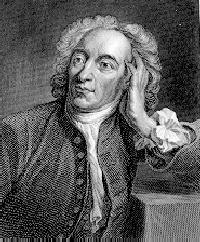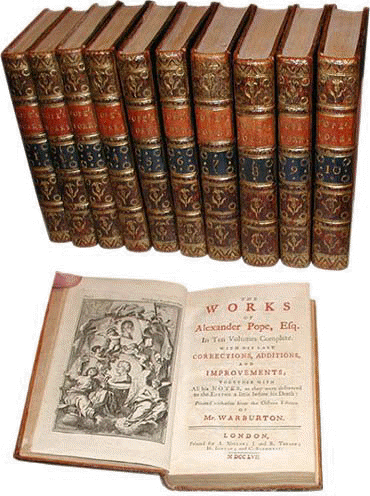

1688-1744
(Note: terms and lines indicated in boldface are especially important. Hint, hint.)
Pope was a cit, banned from public advancement and excluded from higher education because he was Catholic, shunned and mocked because his spine was twisted by spinal tuberculosis as a child and he never grew above 4’6". So he is the ultimate outsider, yet by his talent became one of the most popular writers of the first half of the 18th century. His family background might have made him a Whig but he was ultimately and completely Tory.
According to the New Catholic Encyclopedia, "Probably no writer…ever made more enemies than Pope." Along with Swift, Arbuthnot, and Gay, Pope formed the Scriblerus Club in 1713 and spent the next three decades lampooning his literary and political enemies in print. Most of them were second-rate, and there’s a crazy kind of irony in the fact that we still remember them—not for their own works but as Pope’s victims. He gave them a kind of immortality. (See The Dunciad for some of his skewering.)
Pope was also a successful businessman. Although he did not invent the systems of literary patronage or subscription publication (getting people to pay in advance for him to write and publish a particular work), he certainly exploited them. He was expert at releasing small parts of works in progress along the way to create a demand for his works. From the profits off of his translations of The Iliad and The Odyssey he made enough money—probably more than £5,000—to buy a country estate at Twickenham and live like a gentleman for the rest of his days. He was famous as a garden designer and when he wanted to expand the gardens at Twickenham, he bought the lot across the road and dug London’s first pedestrian underpass to connect it to his home.
 Like
Milton, Pope studied a great deal on his own and retained what he had studied,
but unlike Milton, Pope bore his learning more lightly. Like Milton, too, he
burst on the literary scene in his early twenties with The Essay on Criticism
(published anonymously to great acclaim) and then The Rape of the Lock, a
mock epic drawn from Milton that gently satirized the social pretensions of
London beaux and beauties. Pope’s satirical position, here and in The Essay
on Man, is that of Horatian satire: an amused view of the foibles of
fallible humanity, offered from the perspective of a detached observer of
excellent taste.
Like
Milton, Pope studied a great deal on his own and retained what he had studied,
but unlike Milton, Pope bore his learning more lightly. Like Milton, too, he
burst on the literary scene in his early twenties with The Essay on Criticism
(published anonymously to great acclaim) and then The Rape of the Lock, a
mock epic drawn from Milton that gently satirized the social pretensions of
London beaux and beauties. Pope’s satirical position, here and in The Essay
on Man, is that of Horatian satire: an amused view of the foibles of
fallible humanity, offered from the perspective of a detached observer of
excellent taste.
Pope’s real genius, aside from his marketing skills, was in perfecting
the heroic couplet as a natural form of verse. Though he is writing
fewer than 50 years after Milton, you’ll notice almost instinctively how
different his heroic couplets are from Milton’s blank verse. Pope takes
the precepts of the Royal Society on the plain style for prose and makes
them work in poetry. That’s why he’s one of the most frequently quoted poets
in the English language.
The Essay on Criticism (1711)
This "essay"—a prose form that Pope adapts into poetry—is part of an ongoing critical debate about whether poetry should be "natural"—that is, spontaneous and unrestrained, or "artificial"—that is, carefully crafted following the models of the ancients, particularly Homer, Aristotle, Cicero, Horace, Virgil, Longinus, and Quintilian. Pope’s answer is ambiguous: his position is that the ancients drew their rules from careful and thorough observation of Nature, and that Nature reflects the grand design of God’s mind. Therefore the rules for good writing that a poet should follow are natural—or as Pope calls them, "Nature methodiz’d." Good poetry and good art, for Pope, are like religion and morality—they reflect natural law and the mind of God. While only God, the Divine Architect of the Universe, can see all things and understand his Grand Plan, a man of taste—i.e. an intelligent and educated critic—can appreciate and point out the echoes of Divine Order in works of art.
The Essay on Criticism is divided into three parts. Part 1, lines 1-200,
establishes Pope’s opinion of what constitutes the proper moral qualities,
virtues, and behaviors that are found in the good critic. Important lines to
look at are 9-10, 15-16, 36-67, 60-61, 68-75, 88-91, 98-99, 118-121,
139-40, 152-54, 154-55, 163-66, and 199-200. Basically he tells the would-be
critic to study deeply and broadly, take the time to form considered judgments,
look at the effect of the whole even if there are minor flaws in some of the
parts, and to cultivate his wit.
Part 2, lines 201-559, delineate the flaws Pope sees among current and fashionable critics. Most of these come down to one flaw: overweening Pride (line 204). He argues that Pride takes the place of wit in most fashionable critics, when wit is what they want. This section has some of the most memorable lines in the poem, such as 215-16; but the parts to really examine closely are 233-245 (especially 242-45), and 297-98. Pope demonstrates his ability to mock less talented writers when he plays around with meter and sound effects in 345-57 and 364-67. Two of his most important axioms come in 384-85, when he advises critics to avoid going to extremes, and in 522-24, when he reminds them to remember that writers—and critics—are humans, and have less than godlike perception and talents.
Part 3, lines 560-end, connect the correct application of criticism to moral value and worth. The critic, if he acts intelligently, is modeling the actions of God, which makes criticism not only a worthy action but a necessary one. Therefore, it must be approached carefully; see line 625. The critic should model himself on those previous writers, especially Aristotle, Homer, and Horace, who have proven to be good models. As lines 739 ff. stress, the critic should seek above all for balance and perspective.
All in all a pretty comprehensive curriculum for training moral critics—especially since the author was 21 at the time he wrote this!
The Essay on Man
Pope’s grand plan was not to write an epic as Milton did but to put together a series of verse epistles in the Horatian sense that would offer a moral critique of human behavior. The Essay on Man, which consists of four epistles, is about Man in general, not individual men. (And it’s mostly about male Men; women get little shrift in Pope’s philosophy.)
 The first and third paragraphs on p. 2542 on the "Design" of the Essay
on Man are very important to understanding the work. Pope is dealing with
Man in the abstract, as He has been studied by scientific observation (the Royal
Society method). Pope chooses to use verse because it is more elegant and
memorable than prose.
The first and third paragraphs on p. 2542 on the "Design" of the Essay
on Man are very important to understanding the work. Pope is dealing with
Man in the abstract, as He has been studied by scientific observation (the Royal
Society method). Pope chooses to use verse because it is more elegant and
memorable than prose.
Pope divides the first book of the poem into numbered verse paragraphs, which is helpful. In his opening he deliberately creates an imitation of Milton in vindicating, rather than justifying, the ways of God to Man. ¶1 introduces the concept of the Great chain of being. Pope’s argument is that all things have their place, and that we see echoes of God’s way of thinking in each level, though the echoes fade the lower we go. ¶2 notes where man falls in this great chain, and says that though Man is imperfect, that’s no bad reflection on God, who has a greater plan for us all that we mere imperfect mortals cannot always discern. See especially 69-72 for a statement about Man’s limitations. In ¶3, Pope points out that it is human nature to have hope for a particular fate rather than defer to God’s dispassionate judgment. See especially 87-90, 95, and 99.
In ¶4, Pope argues that pride—a significant moral weakness—is what leads Man to question God’s will. He defies rebellion in one very memorable couplet, 129-30. He does allow in ¶5 that some chaos is natural within Divine Order—esp. 168-70. And he argues in ¶6 that if man was meant to fly, God would have given him wings—see the funny couplets 193-96. ¶s 8 and 9 reiterate the notion of God the Great Designer and the importance of knowing (and staying in) our place in the Great Chain of Being as an act of moral obedience. There is a strong emphasis on submission to Divine Will—not on trying to change our state. Thus ¶10 is very important, especially its last couplet, 293-94.
You can see in this argument for accepting the status quo the roots of 18th century complacency. Don’t like your state? Don’t like how you are treated? No matter—you can’t tell why God has put you there. Just submit and enjoy it. This moral certainty—which some would definitely call smugness—leads to the toleration of slavery, of the denial of voting and other human rights, to the acceptance of workhouses and child labor, to a deliberate blindness to the needs of the poor and infirm—because "Whatever is, is RIGHT." Personally, it’s why I always want to smack Pope. But not everyone feels that way.